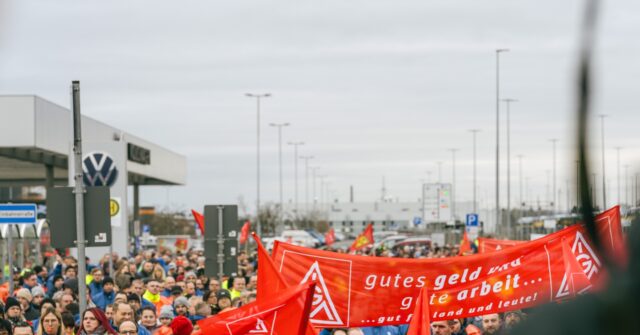Volkswagen workers across Germany initiated rolling two-hour strikes at nine factories on Monday, signaling their strong opposition to proposed pay cuts and potential factory closures. This labor action was prompted by the company’s assertion that financial reductions are essential to navigate a struggling European automotive market. The strikes began at the company’s headquarters in Wolfsburg, where employees gathered in protest against management’s aggressive cost-cutting measures which threaten the future of their workplaces. These actions not only highlight the workers’ concerns but also their collective stance against the impact of necessary adjustments on their livelihoods.
The company’s management argues that to remain competitive, it must align labor costs in Germany with those at its Eastern European and South American plants. Daniela Cavallo, the chief employee representative, emphasized that workers should not be the only ones bearing the burden of the organization’s failings regarding product development and the launch of a more affordable electric vehicle. During a spirited rally in Wolfsburg, she urged management and shareholders to contribute to the company’s financial restructuring efforts rather than placing the entire burden on the workforce. This led to a call for a balanced involvement from all stakeholders as negotiations resume.
The ongoing strikes are termed “warning strikes,” a typical approach in German labor negotiations, occurring amidst efforts for a new labor agreement after a mandated peace period had lapsed. The IG Metall industrial union, representing the workers, indicated that additional job actions might be scheduled in the upcoming days based on negotiations, which are expected to be critical for determining the trajectory of the discussions. Cavallo warned that the upcoming round of negotiations could lead to either reconciliation or escalating tensions, demonstrating the uncertain and precarious position employees find themselves in.
Volkswagen is seeking a 10% pay reduction for approximately 120,000 workers in Germany while proposing to close three of its European plants, stirring significant unrest among employees. The regional leader for IG Metall in Lower Saxony, Thorsten Gröger, has warned that the labor unrest may evolve into one of the most challenging conflicts the company has ever faced. Such measures reflect the company’s urgent need to deal with decreased production capacity and streamline its operations in response to market realities that have changed markedly.
Volkswagen is grappling with declining demand in Europe, compounded by escalating operational costs and stiff competition from Chinese automakers. Thomas Schaefer, head of the Volkswagen brand, noted the manufacturer’s need to make adjustments as the market has contracted from an annual vehicle production capacity of 16 million to about 14 million. Given Volkswagen’s considerable market share, these shifts translate into significant losses of around 500,000 cars per year. With previously stable profits from China no longer compensating for these challenges, the time has come for the company to confront these operational and economic hurdles more aggressively.
The rolling strikes commenced at the Zwickau plant in eastern Germany and were set to affect multiple facilities including those in Braunschweig, Chemnitz, Dresden, Emden, Hanover, Kassel, and Salzgitter. As the labor dispute unfolds, workers and management are preparing for heightened dialogue scheduled for December 9, where crucial decisions about the workforce’s future and the company’s direction will be negotiated. The ongoing tension illustrates the broader struggle within the automotive sector to adapt to changing market dynamics while balancing the needs and rights of employees with corporate viability.

